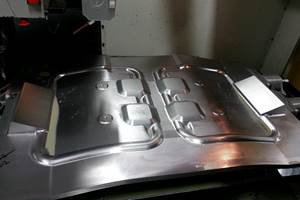Machining The Majority Of Job Shop Parts
This builder has introduced a compact vertical machining center and a compact lathe, both with the same full CNC functionality as larger machines.
Share





In a typical job shop, most of the CNC machines have capacity going to waste most of the time. Look to any of the vertical machining centers in your own shop, and you may see the reason why. Chances are, the job set up on that machine right now doesn’t come close to demanding all of the available travels.
And CNC lathes tell a similar story. Usually, the part takes up only a portion of the maximum possible workpiece diameter.
So why are these oversize machines used for the work? Simple. One reason is that standard-size CNC machine tools are larger than standard-size jobs. Another reason is that orders for bigger parts sometimes do come in . . . and when they do, a shop that makes its living on contract work has to be ready for them.
But when it comes to making the best use of a shop’s available capital, an important consideration is just how often the shop does see these jobs that are large enough to take advantage of a standard-size machine. If the answer is “not all the time,” then the next CNC machine tool the shop purchases may not need to have so much capacity. Instead, those larger jobs can be assigned to an existing, standard-size machine, while the shop saves money by making the next machine it buys more compact. This machine can let the shop increase its capacity to handle just the smaller, more typical parts.
That’s the thinking behind two new machines from Haas Automation (Oxnard, California). The builder has introduced a compact vertical machining center and a compact lathe, both with the same full CNC functionality as larger machines.
The VMC, called “Mini Mill,” features a footprint of about 5 feet by 6 feet, for a machine with XYZ travels of 16 by 12 by 10 inches. Peak spindle rating (three-phase) is 10 hp.
The lathe, called SL-10, has a comparable footprint of 6 feet by 4 feet. Its chuck capacity is 8 inches, bar capacity is 2 inches, and maximum workpiece dimensions are 10.5-inch diameter by 14 inches long. Peak spindle rating is 15 hp.
The small machines can also allow CNC machining capacity to be expanded in shops where floorspace is critically limited. However, in addition to established CNC shops, there is another type of machine shop that a compact CNC machine may benefit. The small price means the machine may be a good fit for some of the smallest shops—particularly those currently not using CNC, or using it only in a limited capacity. A compact machine may offer an easy way to step up to full CNC capability.
This is particularly true in the case of machining center work. The Haas VMC is priced at $29,900. (Price for the lathe is $39,900.) So where a small shop may be preparing itself to commit both capital and floorspace to its next programmable knee mill, for example . . . a small CNC machining center might make a reasonable alternative. MMS
Related Content
How I Made It: Aneesa Muthana
Aneesa Muthana grew up helping out at her parents’ Chicago grinding shop before striking out on her own in the ‘90s. When business slowed down dramatically, she embraced change and built her machine shop into a modern facility using Swiss-type CNC machines.__PRESENT
Read More4 Tips for Staying Profitable in the Face of Change
After more than 40 years in business, this shop has learned how to adapt to stay profitable.
Read MoreSecond B-Axis Improves Efficiency of Swiss-Type Machining
A highly stable, fully programmable B-axis on the subspindle of Nomura DS’s 20J3XBTC enables users to more quickly machine complex parts complete.
Read MoreCustom Motorcycle Parts Made Here: Video Tour of a Family-Owned CNC Machine Shop
Lee Wimmer invited us to tour his second-generation family-owned machine shop in Perkasie, PA. This video explores the production processes behind precision-machined parts for both Wimmer Custom Cycle and LS Wimmer Machine Co., and shows how ingenuity and determination are still at the heart of American manufacturing. Today, both companies are now managed by Wimmer’s three sons.
Read MoreRead Next
Machine Shop MBA
Making Chips and Modern Machine Shop are teaming up for a new podcast series called Machine Shop MBA—designed to help manufacturers measure their success against the industry’s best. Through the lens of the Top Shops benchmarking program, the series explores the KPIs that set high-performing shops apart, from machine utilization and first-pass yield to employee engagement and revenue per employee.
Read MoreAMRs Are Moving Into Manufacturing: 4 Considerations for Implementation
AMRs can provide a flexible, easy-to-use automation platform so long as manufacturers choose a suitable task and prepare their facilities.
Read More





















